人教版-七年级上册-英语知识点-全----第五单元unit-5-知识点
Unit 5 知识归纳人教版英语七年级上册

Name: ________ Class:______Unit 5 知识归纳一、重点短语。
1.play basketball 打篮球2.play soccer/football 踢足球3.play volleyball打排球4.tennis racket网球拍5.baseball bat棒球棒6.ping-pong bat乒乓球拍7.be late for school上学迟到8.Let’s go! 我们走吧!9.Let me get it. 让我去取吧。
10.L et’s watch TV. 让我们看电视吧。
11.go home 回家12.That sounds interesting/ relaxing/boring/ difficult/good/ great.那听起来很有趣/放松/无聊/困难/不错。
13.go to the same school 上同一所学校14.in different classes 在不同的班级15.at school/ at home在学校/在家16.play with friends 和朋友一起玩17.watch them on TV 在电视上看他们18.It is adj. for sb. to do sth.= Doing sth. isadj. for sb. 做某事对某人来说怎么样19.课后/课前/课中after class/beforeclass/in class20.在教室里in the classroom21.p lay computer games 玩电脑游戏22.p lay/do/have sports 做运动三、作文范文。
My name is Gina. I like doing sports. It is interesting for me.I have eight tennis balls, two volleyballs and five soccer balls, but I don’t have a baseball. I have a good friend Jack. We are in the same school. He has a ping-pong ball and two ping-pong bats. After school, he can play it with his classmates. He thinks it’s relaxing. He likes basketball very much. But he only watches it on TV. It’s difficult.It’s time for sports. Let’s play soccer. Come on!。
七年级上册英语正式篇第五单元知识点

Unit 5. Do you have a soccer ball ?语法专项一般现在时态中have的用法教材典句:1.Do you have a ping-pong bat ? Yes, I do .你有一个兵乓球吗?是的,我有。
2.Does he have a soccer ball ? 他有一个足球吗?Yes, he does ./ No, he doesn’t . 是的,他有。
/ 不,他没有。
3.I don’t have a soccer ball ..... 我没有足球.....句1、句2是含有实义动词have的一般疑问句,句3是含有实义动词have的否定句。
下面让我们来学习一下have的具体用法吧!语法全解:1.用法:have意为“有”表示所属关系,其主语一般是人,强调某人拥有某物,有时也可以用作主语。
一般现在时,当主语是第三人称单数形式时,谓语动词用has,其他人称时,谓语动词都用have。
People have their own hobbies. 人们都有自己的业余爱好。
Tom has three pens . 汤姆有3支钢笔。
助记:have的用法动词have表示“有”位置就在主语后;“三单”主语用has, 其他人称用have。
一般疑问句很好变,句首直接把do/ does 添;否定句子也容易,don’t/ doesn’t 加在have/ has 前;does/ doesn’t 句中现,has要用have来替换。
2.句式⑴. 肯定句:主语+have/ has+......I have an eraser. 我有一块橡皮。
He has a soccer . 他有一个足球。
⑵. 否定句:主语+don’t/ doesn’t +have ......I don’t have an eraser. 我没有橡皮。
He doesn’t have a tennis racket . 他没有网球拍。
七年级上册英语第5单元知识点
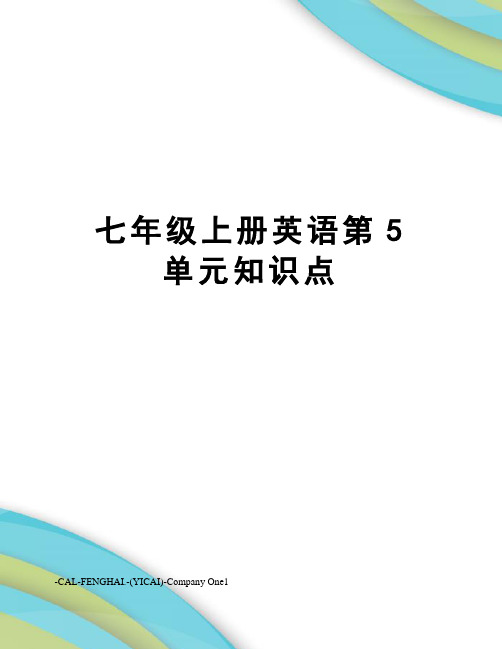
七年级上册英语第5单元知识点-CAL-FENGHAI.-(YICAI)-Company One1Unit5 Do you have a soccer ball?话题:和朋友度过时光教学目标:1. 学会用have对物品的所属进行提问和回答2. 讨论自己喜欢和不喜欢的球类运动,说明原因3. 学会用Let's提建议重点:一般现在时态中have的用法难点:have的用法I have; He/She has…;Do you have a…Yes, I do. / No, I don't.Does he/she have… Yes, he/she does. / No, he/she doesn't.知识点:1.Do you have a ping-pang bat?这是一个一般现在时态的疑问句,have在句中是实义动词。
如果谓语是实义动词,变一般疑问句,常借助于助动词来提问,主语为第三人称单数借助does,其他情况均用do。
do 或does在这里没有实际的意义,仅仅用来帮助构成一般疑问句。
○谓语动词为实义动词的一般疑问句句型:Do/does+主语+动词原形Do you like bananas○陈述句变为一般疑问句的规律借调改加I like bananas. Do you like bananasHe likes bananas. Does he like bananas?She wants a book. Does she want a book?It likes apples. Does it like apples?○回答这种一般疑问句时,肯定Yes, 主语(代词)+do/does. 否定No,主语(代词)+do/does.---Do you know him?---Yes, I do./No, I don't.练习:1. ____ you have a pen Yes, I ____.2. ____they ____ apples No, they ____.3. ____he ____ a basketball Yes, he____.4. ____she ____ 2 books No, ____ ____.5. ____Amy ____ 5 eggs No,____ ____.6. ____Mike____ a baseball Yes,____ ____.7. ____ Peter ____ a tennis ____,he doesn't.8. ____ the boys ___ a volleyball ____,_____ do.9. ____ Jim and Alice ___ a computer No,____ _____.10.____ we ____ a soccer ball Yes,_____ ______.○have为及物动词,意为"拥有,有'第三人称单数形式为has.在它的后面加上某人或某物,表示"有……'。
(新版)人教版七年级上册 Unit 5 重点语

第五单元Section A1c你有一个乒乓球拍吗?是的,我有。
你有一个乒乓球吗?不,我没有。
2d海,海伦,咱们走吧!我们迟到了!好的。
你带棒球了吗?是的,它在我的包里。
我们的棒球棒在哪里?比尔拿着它。
哦,对了。
你拿你的夹克衫了吗?哦,不,我没有。
它在椅子上。
让我去拿它吧。
还有你的帽子!好吧,我拿着我的夹克衫你和帽子。
让我们走吧!Grammar Focus你有一个棒球吗?是的,我有。
/不,我没有。
我有一个排球。
你有一个乒乓球拍吗?是的,我有。
/不,我没有。
我有一个乒乓球。
她有一个网球吗?是的,她有。
/不,她没有。
她有一个棒球。
他有一个足球吗?是的,他有。
/不,他没有。
他有两个乒乓球拍。
他们有一个篮球吗?是的,他们有。
/不,他们没有。
他们有一个排球。
Section B2b你有一个足球吗?弗兰克-布朗:我没有足球,但是我的哥哥艾伦有。
我们去同一所学校上学,并且我们喜爱足球。
在学校里我们与朋友们一起提球。
它是令人放松的。
吉娜-史密斯:是的,我有。
我有两个足球,三个排球,四个篮球和五个棒球及球棒。
我喜欢运动,但是我不玩它们—我只在电视上看它们!王伟:不,我没有。
足球很难。
我喜欢乒乓球,它对我来说很容易。
我有三个乒乓球和两个乒乓球拍。
课后,我跟我的同班同学一起打乒乓球。
U n i t5单词01do /du:/ aux v.&v. 用于否定句疑问句;做;干have /hæv/ v. 有tennis /'tenis/ n. 网球ball /bɔ:l/ n. 球ping-pong /'piŋpɔŋ/ n. 乒乓球bat /bæt/ n. 球棒;球拍soccer /'sɔkə/ n. (英式)足球soccer ball (英式)足球volleyball /'vɔlibɔ:l/ n. 排球basketball /'ba:skitbɔ:l/ n. 篮球hey /hei/ interj. 嘿;喂let /let/ v. 允许;让us /ʌs/ pron. (we的宾格)我们let's = let us 让我们(一起)go /gəu/ v. 去;走we /wi:/ pron. 我们late /leit/ adj. 迟到has /hæz/ v. (have的第三人称单数形式)有get /get/ v. 去取(或带来);得到great /greit/ adj. 美妙的;伟大的play /plei/ v. 参加(比赛或运动);玩耍sound /saund/ v. 听起来好像interesting /'intrəstiŋ/ adj. 有趣的boring /'bɔ:riŋ/ adj. 没趣的;令人厌倦的fun /fʌn/ adj. 有趣的;使人快乐的n.乐趣;快乐difficult /'difikəlt/ adj. 困难的relaxing /ri'læksiŋ/ adj. 轻松的;令人放松的watch /wɔtʃ/ v. 注视;观看TV /ti:'vi:/ n. (=television) 电视;电视机watch TV 看电视same /seim/ adj. 相同的love /lʌv/ v.&n. 爱;喜爱with /wið/ prep. 和......在一起;带有;使用sport /spɔ:t/ n. 体育运动them /ðem/ pron. (they的宾格)他(她、它)们only /'əunli/ adv. 只;仅like /laik/ v. 喜欢;喜爱easy /'i:zi/ adj. 容易的;不费力的after /'a:ftə/ prep. 在......以后class /kla:s/ n. 班级;课classmate /'kla:smeit/ n. 同班同学U n i t5知识梳理02Unit5 Do you have a soccer ball?【重点短语】1. have a volleyball 有一个排球2. play volleyball/tennis 打排球/网球3. have a ping-pong/table tennis 有一个乒乓球4. play ping-pong/table tennis 打乒乓球5. with our friends 和我们的朋友一起6. have a football/soccer ball 有一个足球7. play football/soccer 踢足球8. at school 在校,在上学9. play sports 做运动10. play computer games 玩电脑游戏11. watch TV 看电视12. in the same school 在同一所学校13. after class 下课后14. go to school 去上学【重点句型】1. —Do you have a ping-pong bat? 你有一个乒乓球拍吗?—No, I don’t. 不,我没有。
Unit 5 Do you have a soccer ball 知识点归纳-七年级上册英语

人教版新目标七上英语单元知识点归纳Unit 5 Do you have a soccer ball?重点词汇tennis/'tenis/ n. 网球bat /bæt/ n. 球棒;球拍soccer ball (英式)足球volleyball/'vɔlibɔ:l/ n. 排球basketball/'ba:skitbɔ:l/ n. 篮球late/leit/ adj. 迟到great/greit/ adj. 美妙的;伟大的play/plei/ v. 参加(比赛或运动);玩耍sound/saund/ v. 听起来好像interesting/'intrəstiŋ/ adj. 有趣的boring/'bɔ:riŋ/ adj. 没趣的;令人厌倦的fun/fʌn/ adj. 有趣的;使人快乐的n.乐趣;快乐difficult/'difikəlt/ adj. 困难的relaxing/ri'læksiŋ/ adj. 轻松的;令人放松的watch/wɔtʃ/ v. 注视;观看same/seim/ adj. 相同的easy/'i:zi/ adj. 容易的;不费力的class/kla:s/ n. 班级;课classmate/'kla:smeit/ n. 同班同学重点短语:a tennis bat 一个网球拍play basketball 打篮球baseball bat 棒球棒have a soccer ball 有一个足球play soccer 踢足球with our friends 和我们的朋友一起have a ping-pong ball 有一个乒乓球play ping-pong 打乒乓球have a volleyball 有一个排球play volleyball 打排球at school 在校,上学play sports 做运动watch TV 看电视in my bag 在我的包里be late 迟到on TV 电视上必背典句:1. Do you have a soccer ball? 你有一个足球吗?2. Does he/she have a ping-pong ball?他/她有一个乒乓球吗?3. Do you play sports with your classmates? 你和你的同学一起做运动吗?4. Let’s play soccer together! 我们一起踢足球吧!5. How many sports do you like?你喜欢多少种运动?6. I like playing soccer and basketball. 我喜欢踢足球和打篮球。
七年级上英语unit5知识点归纳

七年级上英语unit5知识点归纳本文将对七年级上英语Unit5的知识点进行归纳,希望能帮助同学们更好地掌握这一单元的内容。
一、询问和回答方位当我们想询问某个地点的位置时,可以用以下句式:Where is the...?(...在哪里?)例如:Where is the library?(图书馆在哪里?)When you go straight, you will see it on your right.(一直直走,你会在右边看到它。
)回答时可以使用以下的表达方式:It is(在)+ 位置名称 +(的)+ 方向。
例如:Where is the supermarket?It is on the left of the school. (超市在学校左边。
)二、介绍人物当我们想介绍一个人时,可以从以下方面进行介绍:1.姓名What’s his/her name?(他/她叫什么名字?)His/Her name is…2.国籍Where is he/she from?(他/她来自哪个国家?)He/She is from…3.年龄How old is he/she?(他/她多大了?)He/She is … years old.4.兴趣爱好What does he/she like?(他/她喜欢什么?)He/She likes…5.外貌特征What does he/she look like?(他/她长什么样子?)He/She is tall/short, has (blonde/brown/black) hair and(blue/green/brown) eyes.三、谈论活动安排当我们想询问或者告诉别人自己的活动安排时,可以用以下句式:1.询问别人的活动安排What are you going to do…?(你打算做什么?)Are you free on...?(...的时候你有空吗?)例如:What are you going to do this weekend?(这个周末你打算做什么?)I am going to visit my grandparents.(我准备去拜访我的祖父母。
最全面人教版七年级上册英语第五单元知识点归纳总结
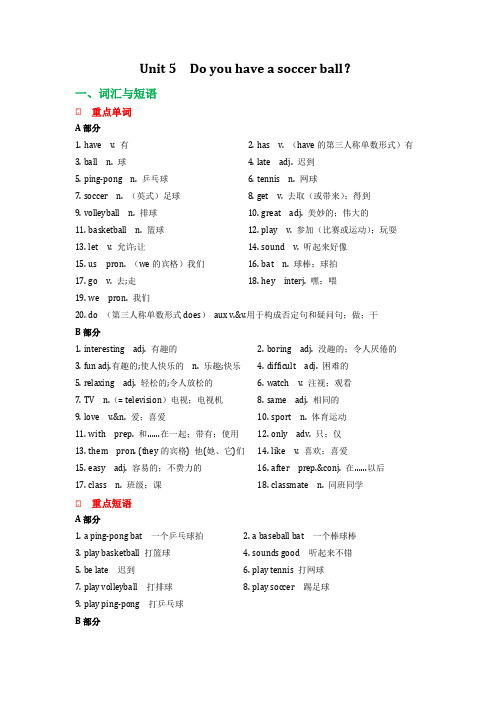
Unit 5 Do you have a soccer ball?一、词汇与短语● 重点单词A部分1.have v. 有2.has v. (have的第三人称单数形式)有3.ball n. 球te adj. 迟到5.ping-pong n. 乒乓球6.tennis n. 网球7.soccer n. (英式)足球8.get v. 去取(或带来);得到9.volleyball n. 排球10.great adj. 美妙的;伟大的11.basketball n. 篮球12.play v. 参加(比赛或运动);玩耍13.let v. 允许;让14.sound v. 听起来好像 pron. (we的宾格)我们16.bat n. 球棒;球拍17.go v. 去;走18.hey interj. 嘿;喂19.we pron. 我们20.do (第三人称单数形式does)aux v.&v.用于构成否定句和疑问句;做;干B部分1.interesting adj. 有趣的2.boring adj. 没趣的;令人厌倦的3.fun adj.有趣的;使人快乐的n. 乐趣;快乐4.difficult adj. 困难的5.relaxing adj. 轻松的;令人放松的6.watch v. 注视;观看 n.(= television)电视;电视机8.same adj. 相同的9.love v.&n. 爱;喜爱10.sport n. 体育运动11.with prep. 和……在一起;带有;使用12.only adv. 只;仅13.them pron. (they的宾格) 他(她、它)们14.like v. 喜欢;喜爱15.easy adj. 容易的;不费力的16.after prep.&conj. 在……以后17.class n. 班级;课18.classmate n. 同班同学● 重点短语A部分1.a ping-pong bat 一个乒乓球拍2.a baseball bat 一个棒球棒3.play basketball 打篮球4.sounds good 听起来不错5.be late 迟到6.play tennis 打网球7.play volleyball 打排球8.play soccer 踢足球9.play ping-pong 打乒乓球B部分1.play computer games 玩电脑游戏2.play volleyball 打排球3.go to the same school 上同一所学校4.watch TV 看电视5.sound interesting 听起来很有趣6.at school 在学校7.with them 和他们一起8.with our friends 和我们的朋友9.watch them on TV 在电视上看它们10.after class 下课后11.watch sports 看体育运动12.in the same school 在同一所学校13.play sth. with sb. 和某人玩某物14.love sports 喜爱运动● 重点句子A部分1.--Do you have a ping-pong bat? --No, I don't.你有一个乒乓球拍吗?不,我没有。
人教版七年级上册英语Unit5

人教版七年级上册英语Unit5-Unit6词组Unit51. a tennis ball 一个网球2. a tennis racket 一个网球拍3. a ping-pong ball 一个乒乓球4. a ping-pong bat 一个乒乓球拍5. a soccer ball 一个足球6. a volleyball 一个排球7. a basketball 一个篮球8. a baseball 一个棒球9. a baseball bat 一个篮球拍10.play tennis 打网球11.play ping-pong ball 打乒乓球12.play soccer 踢足球13.play volleyball 打排球14.play basketball 打篮球15.play baseball 打棒球16.Let sb do sth 让某人做某事17.Let’s go, shall we?让我们走吧,好吗?18.Let us go, will you? 让我们走吧,好吗19.Let me get it. 让我把它取来20.Let’s play.让我们玩吧21.Let’s ask.让我们问问22.be late for 做---- 迟到了23.I’m late for school. 我上学迟到了24.Eric is late for class. 埃里克上课迟到啦25.Don’t be late for school/class.上学(课)别迟到26.I have a tennis ball. 我有一个网球27.Do you have a tennis ball? 你有一个网球吗28.Yes, I do./No, I don’t.是的,我有。
不,我没有29.I don’t have a tennis ball.我没有一个网球30.Bill has a baseball bat. 比尔有一个棒球拍31.Does Bill have a baseball bat? 比尔有个棒球拍吗32.Yes, he does. /No, he doesn’t.是的,他有。
七年级-人教版-英语-上册-Unit-5-单元复习课
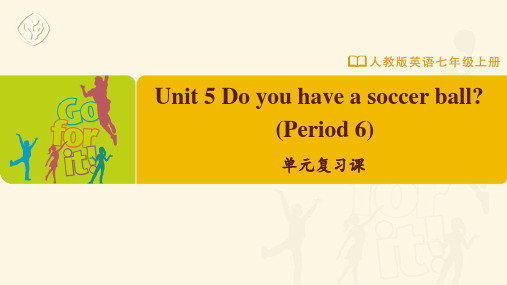
考点突破
2.let
(1)let 为使役动词,意为“允许;让”。“let sb. (not)
do sth.”表示“让某人做(不做)某事”。
知识 复现
(2)let 引导的祈使句“Let’s do sth.”常用来提出建议, 其肯定回答一般用“OK. / Good. / Great! / All right. / That
知识复现 (2)It’s + adj. + for sb. to do sth. 意为 “对某人来说做某事是…… 的”,该结构中的形容词一般是描述事物性质的,如 easy、 difficult、hard、important、interesting 等。
考点突破
8.It’s + adj. + for sb. 句型
考点突破
7.same
(1)same为形容词,意为“相同的”,常用结构“the
知识 复现
same as”意为“与……相同”。 (2)different 是 same 的反义词,意为“不同的”,常
用结构“be different from”,意为“与……不同”。
考点突破
8.“It’s + adj. + for sb. ”句型 ① 我们班里的很多女生不喜欢打篮球。她们认为打篮球对于她们来说很难。 Many girls in our class don’t like playing basketball. They think __it_’_s_ _d_i_ff_ic_u_l_t_ for them. ② 我很喜欢英语,并且对于我来说,学好英语很容易。 I like English very much and it’s __e_a_s_y__ for me ___t_o_ __l_e_ar_n__ English well.
2022-2023人教新目标英语七年级上册Unit-5单元知识点总结与练习

人教新目标英语七年级上册Unit 5 Do you have a soccer ball ?Section A语法:一人称I / we二人称you / you三人称单数he / she / it / Mary / LiLei / Jim 一个人或物三人称复数they / my parents / LiLei and Jim 两个或两个的人或物当主语是一人称,二人称,三人称复数时,动词用have , 当主语是三人称单数时,动词用has用have/ has 填空。
1 They ______ a nice room .2 Li Lei and LiPing _______ an aunt .3 She _____ a sister .4 He _____ a son .5 Jim _____ seven books .6 John _____ has a soccer ball7 You _____ tennis bats .8 I _____ a basketball .9 We ______ some good friends . 10 My brother ____ a car .11 His grandma _____ a daughter . 12She _____ a ping—pong ball .一般现在时(一)have / has的用法一般疑问句:have/ has 是动词,变一般疑问句时,要加助动词.句中是have就直接在句首加do, 如果是三人称单数has就在句首加does, 后面的has就变为原形have. 句首是do, 就用do回答,句首是does, 就用does回答。
无论肯定否定回答都要用相应的人称代词,不要用名词回答。
变为否定句时,直接在动词have前加don’t,如果是三人称单数has就在has前加doesn’t 然后has变为动词原形have.1. 肯定句:I have a ball. 我有一个球。
七年级上册英语第五单元

七年级上册英语第五单元以下是人教版七年级上册英语第五单元的内容,供您参考:
Unit 5 Do you have a soccer ball?
Section A
1. 词汇:
have
soccer
ball
let
us
play
with
them
can
I
we
your
friend
she
he
her
his
2. 常用表达:
Do you have a soccer ball? 你有一个足球吗?
I don’t have a soccer ball. 我没有足球。
Let’s play soccer. 让我们踢足球吧。
3. 语法:一般现在时(第三人称单数形式)的基本用法。
4. 课文内容:通过对话形式介绍朋友之间互相询问拥有物品的情况,并邀请对方一起玩。
5. 练习:完成课本上的练习题,包括词汇、语法和阅读理解等。
Section B
1. 词汇:增加一些与运动相关的词汇,如basketball、ping-pong、volleyball等。
2. 常用表达:增加一些与运动相关的表达,如“I like playing basketball.”、“Do you want to play ping-pong?”等。
3. 语法:介绍更多的情态动词,如“can”、“may”、“must”等的基本用法。
4. 课文内容:通过对话形式介绍各种运动,并询问对方是否喜欢某项运动。
5. 练习:完成课本上的练习题,包括词汇、语法和阅读理解等。
6. 听力和口语练习:听力和口语练习,以提高英语交际能力。
人教版七年级英语上册unit 5--6期末基础知识点复习及训练(含答案)
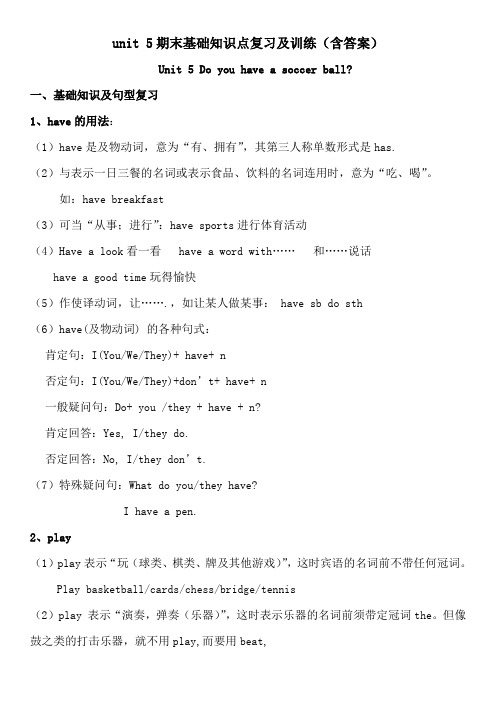
unit 5期末基础知识点复习及训练(含答案)Unit 5 Do you have a soccer ball?一、基础知识及句型复习1、have的用法:(1)have是及物动词,意为“有、拥有”,其第三人称单数形式是has.(2)与表示一日三餐的名词或表示食品、饮料的名词连用时,意为“吃、喝”。
如:have breakfast(3)可当“从事;进行”:have sports进行体育活动(4)Have a look看一看 have a word with……和……说话have a good time玩得愉快(5)作使译动词,让…….,如让某人做某事: have sb do sth(6)have(及物动词) 的各种句式:肯定句:I(You/We/They)+ have+ n否定句:I(You/We/They)+don’t+ have+ n一般疑问句:Do+ you /they + have + n?肯定回答:Yes, I/they do.否定回答:No, I/they don’t.(7)特殊疑问句:What do you/they have?I have a pen.2、play(1)play表示“玩(球类、棋类、牌及其他游戏)”,这时宾语的名词前不带任何冠词。
Play basketball/cards/chess/bridge/tennis(2)play 表示“演奏,弹奏(乐器)”,这时表示乐器的名词前须带定冠词the。
但像鼓之类的打击乐器,就不用play,而要用beat,例:play the piano/violin/guitar(3)play有“进行体育活动,与……比赛”之意play (=have或do)sports进行体育活动(4)表示“播放……”例:Play me their new CD, please.3、Let’s=let us 后接动词原型。
让我们――吧。
例:Let’s play ping-pang.4、That sounds good.句中sound 为听起来,听上去。
人教版七年级英语上册各单元知识点总结
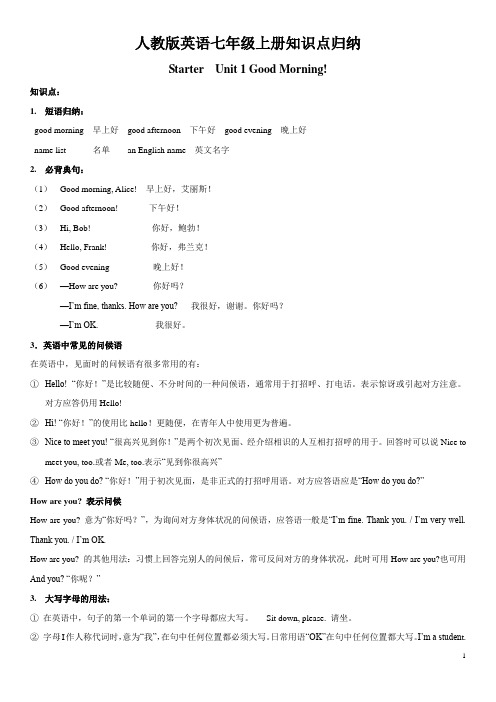
人教版英语七年级上册知识点归纳Starter Unit 1 Good Morning!知识点:1.短语归纳:good morning 早上好good afternoon 下午好good evening 晚上好name list 名单an English name 英文名字2.必背典句:(1)Good morning, Alice! 早上好,艾丽斯!(2)Good afternoon! 下午好!(3)Hi, Bob! 你好,鲍勃!(4)Hello, Frank! 你好,弗兰克!(5)Good evening 晚上好!(6)—How are you? 你好吗?—I’m fine, thanks. How are you? 我很好,谢谢。
你好吗?—I’m OK. 我很好。
3.英语中常见的问候语在英语中,见面时的问候语有很多常用的有:①Hello! “你好!”是比较随便、不分时间的一种问候语,通常用于打招呼、打电话。
表示惊讶或引起对方注意。
对方应答仍用Hello!②Hi! “你好!”的使用比hello!更随便,在青年人中使用更为普遍。
③Nice to meet you! “很高兴见到你!”是两个初次见面、经介绍相识的人互相打招呼的用于。
回答时可以说Nice tomeet you, too.或者Me, too.表示“见到你很高兴”④How do you do? “你好!”用于初次见面,是非正式的打招呼用语。
对方应答语应是“How do you do?”How are you? 表示问候How are you? 意为“你好吗?”,为询问对方身体状况的问候语,应答语一般是“I’m fine. Thank you. / I’m very well. Thank you. / I’m OK.How are you? 的其他用法:习惯上回答完别人的问候后,常可反问对方的身体状况,此时可用How are you?也可用And you? “你呢?”3.大写字母的用法:①在英语中,句子的第一个单词的第一个字母都应大写。
人教版英语七年级上册Unit5《Do you have a soccer ball_》知识点

Unit 5 Do you have a soccer ball?【重点短语】1.have a volleyball 有一个排球2.play volleyball/tennis 打排球/网球3.have a ping-pong/table tennis 有一个乒乓球4.play ping-pong/table tennis 打乒乓球5.with our friends 和我们的朋友一起6.have a football/soccer ball 有一个足球7.play football/soccer 踢足球8.at school 在校,在上学9.play sports 做运动10.play computer games 玩电脑游戏11.watch TV 看电视12.in the same school 在同一所学校13.after class 下课后14.go to school 去上学【重点句型】1.—Do you have a ping-pong bat? 你有一个乒乓球拍吗?—No, I don’t. 不,我没有。
2.—Do they have a computer? 他们有一台电脑吗?—Yes, they do. /No, they don't. 是的,他们有。
/不,他们没有。
3 .—Does he have a tennis ball?他有一个网球吗?—Yes,he does. /No, he doesn’t.是的,他有。
/不,他没有。
4.He has two ping-pong bats.他有两个乒乓球拍。
5.They have a computer.他们有一台电脑。
6.I don't have a soccer ball, but my brother does.我没有足球,但是我兄弟有。
7.She doesn’t have a volleyball.她没有排球。
8.Let’s play basketball!让我们(一起)去打篮球吧!9.That sounds good.那听起来不错哦。
七年级上册英语五单元知识点总结
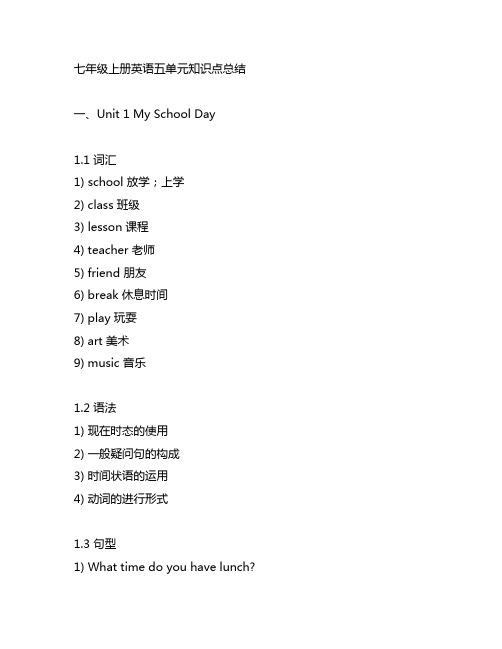
七年级上册英语五单元知识点总结一、Unit 1 My School Day1.1 词汇1) school 放学;上学2) class 班级3) lesson 课程4) teacher 老师5) friend 朋友6) break 休息时间7) play 玩耍8) art 美术9) music 音乐1.2 语法1) 现在时态的使用2) 一般疑问句的构成3) 时间状语的运用4) 动词的进行形式1.3 句型1) What time do you have lunch?2) When do you have art?3) Do you play football at break time?二、Unit 2 My Favourite Season2.1 词汇1) season 季节2) summer 夏天3) autumn 秋天4) winter 冬天5) spring 春天6) hot 炎热的7) cold 寒冷的8) weather 天气2.2 语法1) 形容词的比较级和最高级2) 物主代词的使用3) there be 句型的运用2.3 句型1) What's your favourite season?2) Which season do you like best?3) How's the weather in spring?三、Unit 3 My Weekend3.1 词汇1) weekend 周末2) Saturday 星期六3) Sunday 星期日4) go shopping 去购物5) watch TV 看电视6) playputer games 玩电脑游戏3.2 语法1) 一般现在时的肯定句、否定句和疑问句2) 频度副词的使用3) 动词短语的运用3.3 句型1) What do you do at the weekend?2) How often do you playputer games?3) Do you go shopping on Sundays?四、Unit 4 My Favourite Things4.1 词汇1) colour 颜色2) red 红色3) blue 蓝色4) white 白色5) green 绿色6) yellow 黄色7) black 黑色8) pink 粉色9) orange 橙色4.2 语法1) 形容词的位置2) be 动词的肯定句、否定句和疑问句3) 介词的使用4.3 句型1) What's your favourite colour?2) Is it red or blue?3) Do you like black or white?五、Unit 5 My Family5.1 词汇1) family 家庭2) father 父亲3) mother 母亲4) brother 兄弟5) sister 姐妹6) grandparents 祖父母7) uncle 叔叔8) aunt 阿姨5.2 语法1) 形容词的所有格2) 名词的复数形式3) 物主代词的所有格形式5.3 句型1) How many people are there in your family?2) What's your uncle's name?3) Are your grandparents old?总结七年级上册英语五单元涵盖了日常生活中常见的话题,包括学校生活、季节、周末活动、喜爱的事物和家庭成员等。
七年级上册英语正式篇第五单元知识点
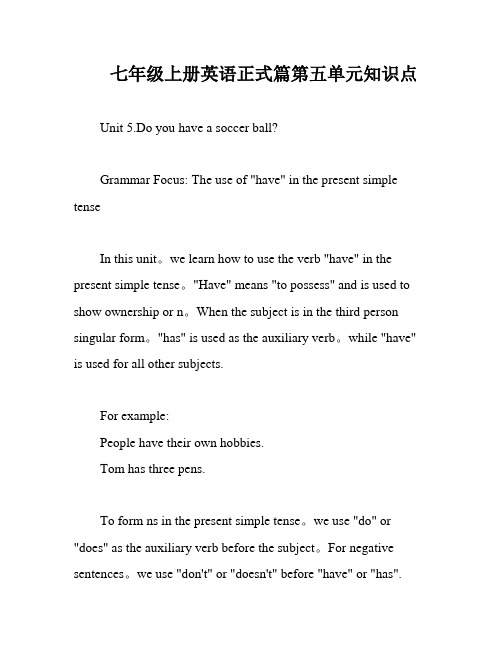
七年级上册英语正式篇第五单元知识点Unit 5.Do you have a soccer ball?Grammar Focus: The use of "have" in the present simple tenseIn this unit。
we learn how to use the verb "have" in the present simple tense。
"Have" means "to possess" and is used to show ownership or n。
When the subject is in the third person singular form。
"has" is used as the auxiliary verb。
while "have" is used for all other subjects.For example:People have their own hobbies.Tom has three pens.To form ns in the present simple tense。
we use "do" or "does" as the auxiliary verb before the subject。
For negative sentences。
we use "don't" or "doesn't" before "have" or "has".For example:Do you have a bike?Does he have a soccer ball?XXX.XXX "have" XXX。
人教版七年级英语上册第五单元知识点

人教版七年级英语上册第五单元知识点常用词组1. have a volleyball 有一个排球2. have three soccer balls 有三个足球3. have a ping-pong bat 有一个乒乓球拍4. have five baseball bats 有五个棒球拍5. play basketball/volleyball/tennis/ping-pong/baseball/soccer 打篮球/排球/网球/乒乓球/棒球/踢足球6. be late for school/class 上学/上课迟到7. at school 在学校8. with our classmates 和我们的同学一起9. go to the same school 上同一所学校10. love sports 热爱运动11. sound boring 听起来很无聊12. let sb. do sth. 让某人做某事13. play sports 做运动14. play computer games 玩电脑游戏15. watch TV 看电视16. in the same school 在同一所学校17. after class 下课后18. watch sports on TV 在电视上看体育(节目)重点句型1. —Do you have a ping-pong bat?你有一个乒乓球拍吗?—No, I don't. I don't have one.不,我没有一个乒乓球拍。
2. —Do they have a computer?他们有一台电脑吗?—Yes, they do./No, they don't.是的,他们有。
/不,他们没有。
3. —Does he have a tennis ball? 他有一个网球吗?—Yes, he does. He has one./No, he doesn't. He doesn't have one.是的,他有一个。
人教版七年级上册英语 Unit 1 - Unit 5 知识点总结

人教版七年级上册英语Unit 1 - Unit 5 知识点总结Unit 1 My name ’s Gina知识点总结一、重点短语、句型1. -What ’s your name?- My name's Gina. = I ’m Gina.你的名字是什么?我的名字是吉娜。
我是吉娜。
2.-What ’s his/her name?- His /Her name ’s Tom/ Gina.=He’s /She’s Tom/ Gina.他/她的名字是什么?他/她的名字是汤姆/吉娜。
他/她叫汤姆/吉娜。
3.- Is she Mary? –Yes, she is./ No, she isn ’t.她是玛丽吗?是的,她是。
不,她不是。
4.-Are you Helen? –Yes, I am 。
/ No, I ’m not.你是海伦吗?是的,我是。
不,我不是。
5. A: What's your telephone number?B: My phone number is 281-9176.It's 281-9176.你的电话号码是多少?我的电话号码是281-9176 。
6. -Nice to meet/see you. -Nice to meet/see you, too. 见到你很高兴。
见到你也很高兴 .st name=family name=last name 姓氏8.first name = given name 名字9.telephone number=phone number 电话号码二、交际用语(一)常见的问候表达方式有:1、Hello/Hi2、Good morning/afternoon/evening/night3、Nice to meet you/Nice to meet you, too4、How are you?5、How do you do?(二)常见的介绍表达方式有:1. I ’ m… /My name ’ s… /This is … /These are … and….2. Nice to meet you.3. What ’ s your phone number?4. It ’ s 2842942.三、语法1、be 的一般现在时形式2、What 引导的特殊疑问句3、形容词性物主代词:my ,your,his,her四、知识点1.My name ’ s Jenny.我的名字叫詹尼。
Unit5知识归纳人教版英语七年级上册

Unit 5 Do you have a soccer ball?短语归纳:1.soccer ball (英式)足球2.a tennis bat 一个网球拍3.baseball bat棒球棒4.pingpong ball 乒乓球5.pingpong bat 乒乓球拍6.play basketball打篮球7.play sports 参加体育运动或比赛, 做运动8.(be) in my hag 在我的包里9.watch TV看电视10.(watch/watches)....on TV 在电视上(看....)11.after class/school 课后/放学后12.go to the same school 去同一所学校上学13.at school 在学校14.play puter games 玩电脑游戏15.play with.... 和...... 玩16.be late for .... (做)......迟到17.an interesting book 一本有趣的书。
句型:1.Sb have sth. 某人有某物。
(They have some books. 他们有一些书。
)Sb(第三人称单数)has sth. 某人有某物。
(Peter has an eraser. Peter有一块橡皮。
)2.Do you/they have......? 你/ 他们有......吗?Yes, I/ they do. (do问do答)是的,我/ 他们有。
No, I/ they don’t. 不,我/ 他们没有。
Does he/she have(助动词+V原).......? 他/ 她有.......?Yes, he/she does. (does问does 答)是的,他/她有。
No, he /she doesn’t. 不,他/她没有。
3.Let’s do sth. 咱们做某事吧。
(Let’s play basketball. 让我们打篮球吧!)Let sb do sth. 让某人做某事吧。
人教版 七年级上册 英语知识点 全。第五单元unit 5 知识点

人教版七年级上册英语知识点全。
第五单元unit 5 知识点Unit 5: XXXIn this unit。
we will focus on two main points。
Firstly。
we will learn how to use the verb "have" in the present simple tense。
Secondly。
we will learn how to make ns using the phrase "Let's."Vocabulary:dohaveXXXping-pong batsoccervolleyballbasketballplayinterestingboringfundifficultrelaxingwatchsameWe will also learn some specific vocabulary related to sports equipment:XXX) or football (American English)XXXbaseball batWe will also learn some useful phrases and structures:be latewatch TVon TVplay sportsXXX using the structure of general yes/no ns with the verb "have."For example:Do they have a basketball?Yes。
they do。
/ No。
they don't.We will also XXX using the structure of general yes/no ns with the verb "do."For example:Do you have lunch at home?Yes。
- 1、下载文档前请自行甄别文档内容的完整性,平台不提供额外的编辑、内容补充、找答案等附加服务。
- 2、"仅部分预览"的文档,不可在线预览部分如存在完整性等问题,可反馈申请退款(可完整预览的文档不适用该条件!)。
- 3、如文档侵犯您的权益,请联系客服反馈,我们会尽快为您处理(人工客服工作时间:9:00-18:30)。
Unit 5谈论物品所属关系。
1、重点词汇:do、have、tennis、ping-pong bat、soccer、volleyball、basketball、play、interesting、
boring、fun、difficult、relaxing、watch、same...
2、soccer ball(英式)足球 a tennis bat一个网球拍baseball bat 棒球拍
be late 迟到watch TV 看电视on TV 在电视上
play basketball 打篮球play sports 做运动或参加体育比赛
3、含有实意动词的一般疑问句的结构及答语。
---Do you /they have a...? e.g. Do they have a basketball?
---Yes,I/they do./No,I/they don’t.
---Does he /she have a...? e.g. Does she have a new schoolbag?
---Yes,he/she does./No,he/she doesn’t.
( )----Do you have lunch at home?
----___________.
A. Yes, I am
B. Yes, I can
C. Yes, I do
D. Yes, I have
4、tennis 和tennis ball的区别:tennis指运动项目名称,即“网球运动”。
tennis ball 则指具
体的球,有单、复数之分。
e.g. a tennis ball/some tennis balls
5、一般现在时中have的用法以及与there be 句型的辨析;
have “有”即某物属于某人,表示所属关系,三单形式为has.
e.g. I have a blue jacket and my sister has a yellow one.
there be “有”主要指的是某地存在某物。
e.g. There are many trees in my school.
6、Play + 球类名称;
e.g. play basketball/soccer ball 打篮球/踢足球
Play + the + 西洋乐器类;(中间必须加定冠词the)
e.g. play the piano/violin 弹钢琴/拉小提琴
()The young man plays ______violin very well, but he plays ________ basketball badly.
A.the;the B. a;a C. a;the D. the;/
7、---Let’s..(用于提出建议或征求别人的意见). let’s = let us
--- OK./All right . /That sounds good/great. /Yes,Let’s... /Sorry,I...
】Let “让……”,使役动词,后加动词原形
e.g. Let’s play./ Let’s ask./Let’s play computer games.
8、That sounds good.(sound的用法)
sound 系动词,“听上去,听起来”,为感官动词,其后跟形容词作表语,它有人称和数的变化,在一般现在时的句子中,其疑问句和否定句要借助于do/does 来完成。
e.g. It/that sounds good / It doesn’t sound too bad.
Does it sound good ?
9、get v.“去取或带来,得到)”
e.g. He gets a lot of letters from his new friends.(收到、得到)
I came here this morning to get the newspaper.(去取、拿)
Go and get me some apples.
10、to o adv.“也”通常用于肯定句中,且常置于句末,其前有逗号,但有时也可以插入句中。
e.g. Perhaps there will be a new hospital here, too. 也许这儿也会建一家新医院。
I
In peace, too, the Red Cross is expected to send help wherever there is human
suffering. 在和平时期红十字会还被期待着在人们有难的地方提供援助。
--- Nice to talk to you.和你谈话很高兴。
--- Nice to talk to you, too.
11、重要形容词的用法:interesting、boring、fun、different、easy、relaxing..
作用有两点:1)放在连系动词后作表语,说明主语的性质;
e.g. The story is very interesting.
2) 放在名词前做定语,修饰名词。
e.g. It is a interesting story.
12、watch“看、观看”,动词,多用于观看电视、足球赛、日出等。
e.g. I often watch TV./I only watch basketball games on TV.
】watch 、see和look的区别:
1)watch 指非常仔细的“看”表示“注视、观看” e.g. watch TV
2)see “看”着重指看的结果,也可用于“看医生”、“看电影”等短语中。
e.g. see a film
3)look “看”强调有意识的动作,多用于唤起别人的注意。
加宾语时,要加介词at , e.g.
look at the picture
13、人称代词主格与宾格的用法:谓语动词前用主格,作主语;谓语动词后用宾格,作宾语。
试着按要求完成下列表格:
14、I don’t have a soccer ball, but my brother Alan does.
为了避免重复,此处用了does 代替了has a soccer ball.
15、on TV/on the computer/on the radio;
16、for +具体的人表示“对……来说”
It + be + adj. + for sb./ It + be + adj .+ for sb. to do sth..(it在句中是形式上的主语,真正的主语是不定式短语,把不定式短语放后面,以免显得句子头重脚轻)
e.g. It’s easy for me.
It’s easy for me to do my housework.
对于我来说踢足球太难了。
(汉译英)
____________________________________________________
对于他们来说打乒乓球太不简单了。
(汉译英)
____________________________________________________
17、with 和……在一起;表伴随,后接代词时,应用兵格形式.
e.g. I like playing basketball with him.
with和and 的区别:
1)、with 是介词,它后面应接宾语,即,名词或代词的宾格。
e.g. with them. 连接两个
主语时,谓语动词的形式取决于句子的第一个主语。
e.g. He goes to school with me every day.
I live with my parents.
2)and 是连词,连接两个并列的单词、短语或句子。
它后面若接代词作主语时,就用主格,作宾语就用宾格;连接两个主语时,谓语动词用复数。
例如:
e.g. I like red and black.(连接两个单词)
Her. Li is our teacher and he is our friend, too.(连接两个句子)
Li lei and I are friends.(连接代词做主语)
He always sings with me.(英译汉)___________________________________________ 他们经常和我一起打篮球。
(汉译英)___________________________________________。
